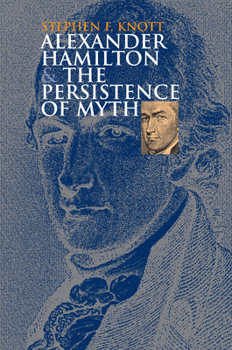Alexander Hamilton and the Persistence of Myth
(Part of the American Political Thought Series)
Select Format
Select Condition 
Book Overview
Alexander Hamilton and the Persistence of Myth explores the shifting reputation of our most controversial founding father. Since the day Aaron Burr fired his fatal shot, Americans have tried to come... This description may be from another edition of this product.
Format:Hardcover
Language:English
ISBN:0700611576
ISBN13:9780700611577
Release Date:February 2002
Publisher:University Press of Kansas
Length:348 Pages
Weight:1.55 lbs.
Dimensions:1.2" x 6.3" x 9.3"
Customer Reviews
4 ratings
Excellent book for those who like me wanted to know the truth about this great founding father.
Published by Gary Lehrman , 1 year ago
While working in Washington DC during the China flue pandemic & parking next to the treasury building I often walked past the large statue of this great American. I purchased this book after researching the best concise book on Hamilton.
"THOSE WHO STAND FOR NOTHING..."-A. Hamilton
Published by Thriftbooks.com User , 20 years ago
"fall for anything." Construction on the myth began years before Alexander Hamilton died on July 12, 1804. It surely got its nurturing from the National Gazette started in 1791 by Philip Freneau, Madison's Princeton roommate, and Thomas Jefferson. And it surely had its fires flaming during the fallout from Hamilton's Reynolds Affair which tainted his career from then on. From the get go, Hamilton's image was tarnished. He didn't fall for anything however. The day he died is the same day as the battle of the Boyne where the catholic, Stuart King James II and his Jacobites were defeated by the protestant William III, of Orange. Another Hamilton had died in a duel on November 15, 1712 in Hyde Park in London. Although his birth was deemed illegit, Alexander Hamilton was of noble lineage; his father's family was derived from the Scottish, ducal line of Hamilton. Stephen F. Knott's book is not a biography; it's more of a thoughtful, unbiased tracing of pundits' and politicians' interpretation/opinion of his work in American government through the years up to the present. It is a must read for anyone who attempts to judge Hamilton's person because the historical record is replete with misrepresentations of his life's work. Knott's analysis is thorough; you'll understand the bias behind any biographer who studies him. I believe one best understands Hamilton from his own writings and those scholars who studied them as Knott did. Knott shows that Hamilton has been labelled a fascist, a monarchist, a Napoleon, a dictator, a Caesar by mostly Jeffersonians who were content with superficial studies of his life. He also explains how Hamilton viewed popular opinion, how he saw government stood to represent the people, how government stood to protect the people from unwise, even lawless movements such as fascism and communism. Knott also feels that we have much to learn from his thought on how our government should function. In Knott's Chapter 7, entitled Hail Columbia!, he quotes the historian Daniel J. Boorstin as writing, "we are either Jeffersonians or Hamiltonians. In no other country has the hagiography of politics been more important". However, where does Burr fit in? He was Jefferson's Vice President at the time, good friends of the New York governor Clinton who was vehemently opposed to the Constitution. Indeed, New York was the state most resistant to its ratification, very nearly succeeding in killing it altogether if it had not been for Alexander Hamilton and others. And, as Knott relates, Adams, Jefferson, Washington, and the other founding fathers saw Burr as unprincipalled and unfit to govern. As to labelling Jefferson's people as "the beast", Knott rightly traces it to a comment a Henry Adams made, years after Hamilton's death, from a comment he heard fourth hand. I believe, and noone has made the connection, if Hamilton made that comment, "the beast" that he referred to is none other than the symbolic beast of Daniel 7 an
Extraordinary
Published by Thriftbooks.com User , 20 years ago
Knott provides us with a clear account of Hamilton's philosophical contributions and a compelling story about the uncertainty with which Americans approach his legacy. This book is masterful in detailing the competing political agendas and in framing how politicians, acamedicians, and pundits use the Founders and their rhetoric to push forward their own agendas. A wonderful book that helps us understand our American political culture, as much as one of our country's most important Founding Fathers.
Getting right with Hamilton
Published by Thriftbooks.com User , 21 years ago
Finally! A compelling defense of the Founder second only to Washington in terms of indespensibility to the creation and greatness of this county. Professor Knott chronicles the roller-coaster ride of Hamilton's reputation, from his murder by the scoundral Burr to the present. He presents overwhelming evidence that General Hamilton has been abused by critics, historians and Jefferson-lovers alike. Knott's painstaking history of the apochryphal "great beast" comment provides a frightening lesson of how a single malicious report can turn even a great man's historical reputation upside down. The fact that Mr. Hamilton's solitary statue stands ignored at the back door of the Treasury Department while Mr. Jefferson is surrounded by marble and carved words perfectly illustrates how the myth of greatness trumps the reality of greatness. Professor Knott's conclusion that "a return to Hamiltonianism" could fix much of what ails American politics is right on the money. Fantastic book.





